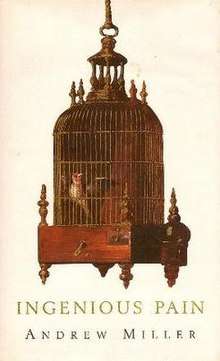Ingenious Pain
Ingenious Pain is the first novel by English author, Andrew Miller, published in 1997.[1] It won the James Tait Black Memorial Prize for Fiction, the International Dublin Literary Award[2] and the Italian Premio Grinzane Cavour prize for a foreign language novel.[3][4][5] The novel was also listed on the New York Times "Notable Books of the Year" for 1997.[6]
 First edition | |
| Author | Andrew Miller |
|---|---|
| Country | England |
| Language | English |
| Genre | Bildungsroman |
| Publisher | Sceptre |
Publication date | 20 February 1997 |
| Media type | |
| Pages | 337 |
| ISBN | 978-0-340-68207-4 |
| OCLC | 154247990 |
| Followed by | Casanova (1998)' |
Plot
James Dyer is born without the ability to feel pain or pleasure. Set in the mid-18th century, the novel follows Dyer as he attempts to come to terms with this disability whilst working as a sideshow freak, then as a surgeon, until his eventual consignment to the Bethlem institute.
Reception
Critics praised Miller's evocative prose, thorough research and precise pacing.
Sarah Broadhurst in a review for Lovereading stated that the book was a "very skilful, densely written, complicated novel" and stated that it was "challenging and intelligent, it is a rewarding read."[7] Publishers Weekly called the novel "inventive", "steeped with specific details" and "beautifully controlled".[8] In a review for The Independent, Josie Barnard praised the tone of the novel, stating "Ambivalence is one of Miller's strengths. He enfolds the reader in the present tense and wields his writing style as coolly and precisely as a scalpel." and also praised his descriptions of the 18th century, stating that "Miller's evocation of the period is thorough. Many of his sentences speak paragraphs, his paragraph pages. Ingenious Pain is a book that gives visceral pleasure.", calling the novel as a whole "sensational".[9] It was again reviewed by The Independent a year later by Lilian Pizzichini who opined that Millers "understanding of contemporary mores is thorough, the period detail precisely evoked, and his characters come alive with flashes of humour and compassion."[10]
Patrick Mcgrath writing for the New York Times was particularly effusive in his praise, calling the novel "peculiar", "colorful" and "complicated"; an "extraordinary first novel". He also praises Millers research, writing that "he writes a fine strong prose thickly larded with the sights, sounds and smells of the period". He also praises the pacing of the novel; and draws comparison to John Fowles's novel The French Lieutenant's Woman; Graham Swift's Waterland; and Peter Ackroyd's "early flamboyant historical pastiches."[11]
References
- "Ingenious pain (Book, 1997)". WorldCat.org. Retrieved 1 December 2011.
- Lister, David (12 March 1999). "McEwan up for top prize - News". The Independent. Retrieved 1 December 2011.
- "Previous winners - fiction | James Tait Black Prize winners | People". Ed.ac.uk. 11 November 2011. Archived from the original on 27 September 2011. Retrieved 1 December 2011.
- "International IMPAC DUBLIN Literary Award". Impacdublinaward.ie. 2000. Archived from the original on 11 October 2011. Retrieved 1 December 2011.
- "Andrew Miller | British Council Literature". Literature.britishcouncil.org. Retrieved 1 December 2011.
- "Notable Books of the Year 1997 - New York Times". Nytimes.com. 7 December 1997. Retrieved 1 December 2011.
- Broadhurst, Sarah. "Ingenious Pain by Andrew Miller - Lovereading UK". Lovereading.co.uk. Retrieved 1 December 2011.
- "Fiction Review: Ingenious Pain by Andrew Miller / Author, Karen Miller / Author". Publishersweekly.com. 31 March 1997. Retrieved 1 December 2011.
- Barnard, Josie (16 March 1997). "Book review / No feelings, but sensational - Books - Arts & Entertainment". The Independent. Retrieved 1 December 2011.
- Pizzichini, Lilian (8 February 1998). "Books: Paperbacks - Arts & Entertainment". The Independent. Retrieved 1 December 2011.
- Mcgrath, Patrick (13 April 1997). "Heart of Ice". Nytimes.com. Retrieved 1 December 2011. (registration required)
| Awards | ||
|---|---|---|
| Preceded by The Land of Green Plums |
International Dublin Literary Award recipient 1999 |
Succeeded by Wide Open |